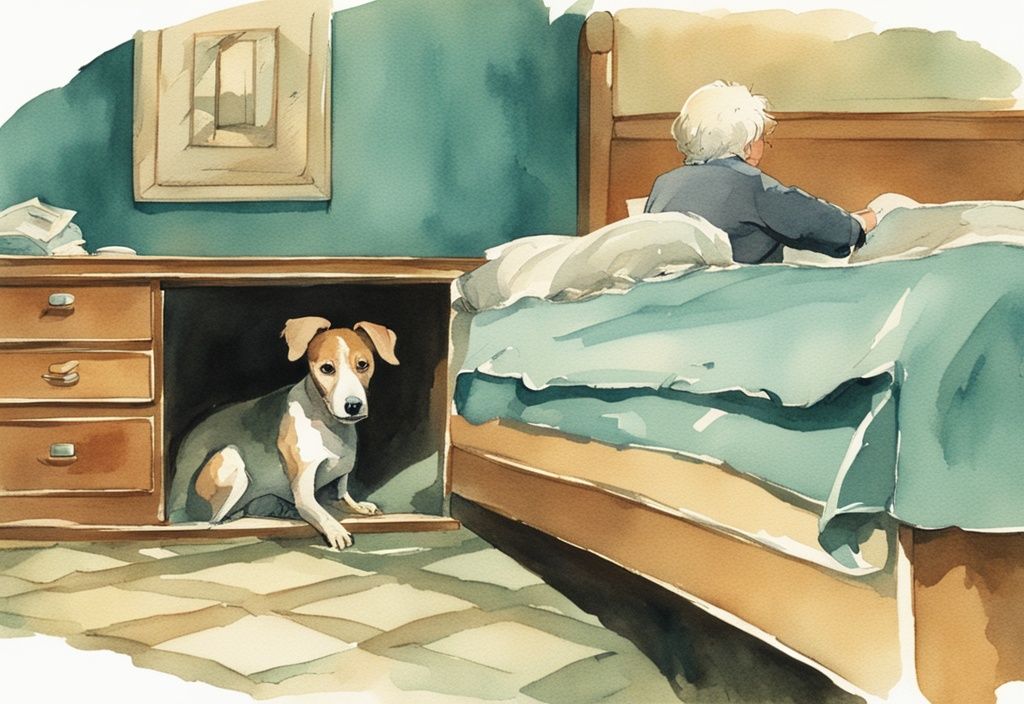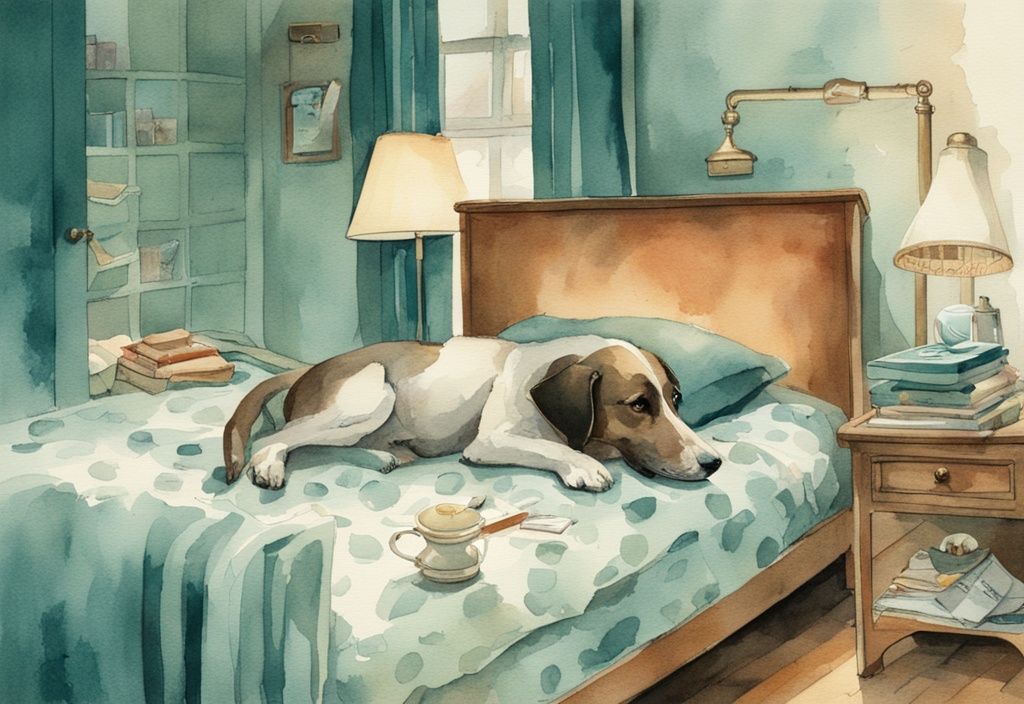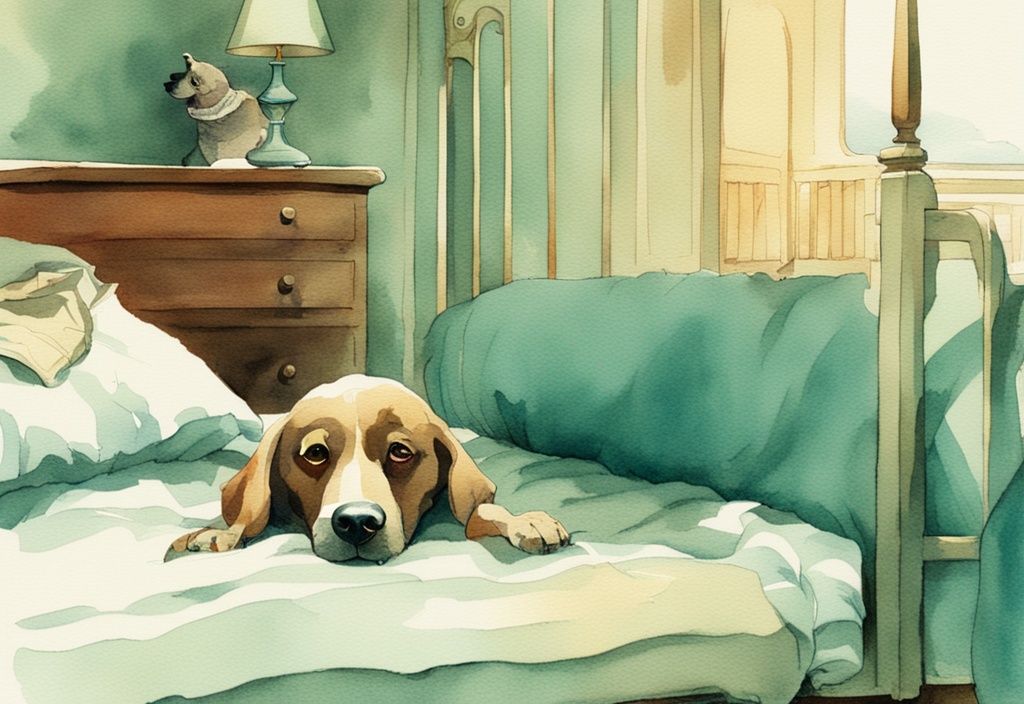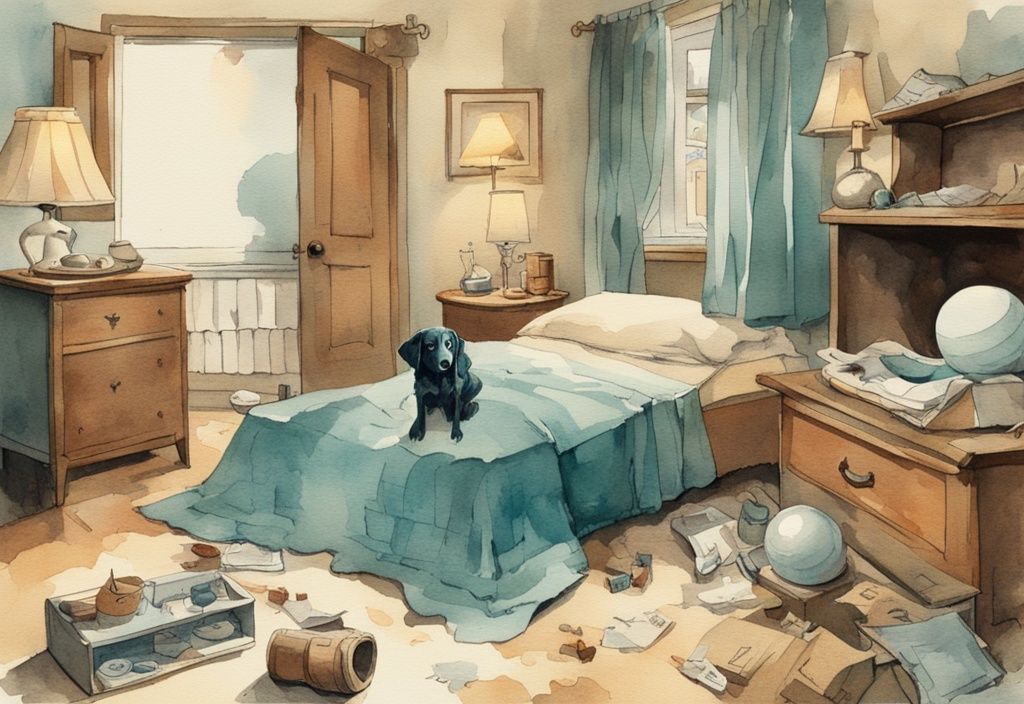“Ever caught your tail-wagger mysteriously burrowed under the bed without a known reason?” I find myself asking this when my canine companion starts behaving out of character. My name’s Lucy, a dog lover like yourself, and this peculiar behavior from our furry friends can worry us, right? But don’t fret! Let’s unravel this mystery together.
You’ve undoubtedly clicked this article because your pet has recently taken to hide under the bed. Rest assured, from my experience with situations like these, the triggers range from anxiety to health concerns. I’ve noticed understanding these reasons can significantly help enhance our friend’s comfort and well-being.
By the end of this article, you’ll be equipped with insights about potential causes of sudden hiding and how to create a safe haven for your dog. With these tips, you’ll feel like the Sherlock of the dog world—an expert detective of canine behaviors. Together, let’s make our four-legged buddies feel loved and secure.
Understanding Your Dog’s Sudden Hiding Behavior
When you find yourself asking, “why is my dog hiding under the bed all of a sudden?” it can be quite startling and downright confusing. But taking a moment to understand this behavior can shed some much-needed light on the situation. Often, it’s just an expression of your dog’s natural canine instincts.
Dogs are wired with certain behaviors aimed at self-preservation. Hiding, for instance, is one such instinct. Think of it as their go-to move when they sense threats or feel uncomfortable, reflecting instincts that are deeply rooted in their ancestry, as discussed in more detail here: https://www.whole-dog-journal.com/behavior/instincts-dna/understand-your-dogs-ancestral-instincts/. In the wild, canines pick out safe, secluded spots to stay out of predators’ sight. Under the bed might just be mimicking that cozy, den-like environment, offering your dog a safe haven when they feel the need for protection.
Another aspect of this instinctual behavior ties back to hunting habits. Wild canines often hide while stalking prey or find dark, enclosed spaces to enjoy their meal in peace. Similarly, your dog might be tapping into these natural instincts, seeking out the comforting seclusion beneath your bed for a little “me time.”
And let’s not forget; many dogs simply adore the snug feeling a tight, cozy space offers. Just as we might retreat to a comforting bedroom or a quiet nook to unwind, dogs find solace in dimly lit, enclosed areas. Under the bed often fits this bill perfectly, making it an inviting retreat when they’re in the mood for some comfort or a little relaxation.
Could it Be Related to Fear and Anxiety?
Dealing with Loud Noises and Stressful Situations
Why is your dog hiding under the bed all of a sudden? It might be due to fear and anxiety triggered by loud noises. Common stressors include car alarms, fireworks, thunderstorms, house parties, car rides, and other sudden loud disturbances. These frightening situations can cause dogs to seek refuge in a secluded and safe spot, such as under a bed.
One effective way to help your dog cope with these fears is to create positive associations with the scary sounds. For instance, gradually exposing your dog to the sounds while offering treats or engaging in play can help alleviate their anxiety over time. Consistently rewarding your dog for calm behavior during these exposures helps to build a positive experience with previously frightening scenarios.
Adjusting to Changes in the Environment
Another reason your dog might be hiding suddenly is due to adjustments in their environment. This behavior can be prompted by new furniture, a different layout, or even moving to a new house. Such changes can be unsettling to a dog, leading them to seek the security of familiar, enclosed spaces like under the bed.
The introduction of new pets, new people, or visiting guests can also make your dog feel anxious or uncertain. They might retreat to hiding spots to avoid interactions until they feel more comfortable with the changes. Taking the time to gently acclimate your dog to these new elements can help reduce their stress and promote a sense of security.
Signs Your Dog may be Stressed
Recognizing the signs of stress or anxiety in your dog is crucial in addressing their hiding behavior. Physical and behavioral indicators include pacing, excessive barking, shivering, depression, destructive behavior, and changes in eating habits. These symptoms can provide insights into their emotional state and help identify why your dog is hiding under the bed all of a sudden.
If you notice these signs in conjunction with the hiding behavior, consider evaluating potential stressors in your dog’s environment. Taking a proactive approach by ensuring a stable, quiet environment and offering comforting reassurance can help your dog feel more secure and less inclined to hide.
Is it a Health Issue?
If you’re wondering why is my dog hiding under the bed all of a sudden, one possible reason may be related to their health. Dogs instinctively seek out quiet, enclosed spaces when they are not feeling well. This behavior can be linked to various physical maladies. For instance, a dog may hide if they have an injury, as movement might exacerbate their discomfort. Moreover, certain illnesses can lead to disorientation or lethargy, prompting your dog to find a temporary refuge under the bed where they feel safe. If you notice your pet showing unusual hiding behavior, it might serve as an indicator that something is amiss with their health.
Symptoms of Illness and Physical Discomfort
Sometimes, it’s the little signs that can tell us a lot about our furry friends. If you spot your dog suddenly retreating to hide under the bed, it may very well be an indicator of health issues lurking beneath the surface. Dogs tend to seek out quiet, secluded spots when they’re feeling unwell. Think about moments when you’ve felt sick; curling up in a cozy, safe place feels instinctively comforting, right? It’s important to regularly check your pet for health issues, as many owners often wonder, what does an embedded tick look like on a dog. Our dogs are no different.

From minor injuries to serious illnesses, physical discomfort can drive this sudden change in behavior. Maybe they’ve hurt themselves, and movements make the pain worse, so they opt for stillness. Some illnesses can cause your dog to feel disoriented or excessively tired, leading them to hide away where they feel secure. It’s their way of telling us something’s off, even if they can’t use words.
When to Seek Veterinary Help
Observing the behavior of why is my dog hiding under the bed all of a sudden shouldn’t be taken lightly. If this hiding is out of the blue and not part of their usual routine, it’s time to dig deeper. A visit to the vet can help rule out underlying medical issues that might not be immediately apparent.
Early intervention is crucial. What seems like a minor discomfort now could potentially turn into something more serious if left unchecked. So, if your pup’s newfound hiding habit sticks around, don’t hesitate. Seeking professional advice is essential to ensure your beloved pet’s well-being and to get to the bottom of any health problems they might be experiencing.
Behavioral or Environmental Factors at Play
Dogs, our loyal companions, often communicate their feelings through their behavior, and sudden hiding can be a significant indicator of underlying issues.
Is Your Dog Trying to Avoid Social Interactions?
Sometimes, dogs hide under the bed to dodge social interactions, especially in noisy or crowded spaces. This cozy retreat might be their way of signaling that they need some quiet time. Just like us, dogs can easily feel overwhelmed by constant social buzz, loud noises, or a bustling home. Recognizing this behavior is crucial. It allows you to offer a serene, quiet corner where your furry friend can unwind and recharge.
Dealing with New Additions in the Home
Big changes in your dog’s environment, like new pets, new people, or even a different house, can prompt sudden hiding under the bed. Dogs thrive on routine and can get stressed or anxious when their familiar surroundings change. A new pet may intrude on their territory, while new visitors can make them feel uncertain. Even rearranging the furniture can be unsettling. It’s essential to allow your dog ample time to adjust to these changes gradually. Providing a steady routine and ensuring they have a familiar, safe space can significantly ease their anxiety.
Age-Related Reasons for Sudden Hiding in Dogs
Sudden hiding under the bed in dogs, especially if they are seniors, can often be related to age and cognitive changes.
Understanding Cognitive Dysfunction in Older Dogs
As your furry friend gets older, you might find yourself asking, “why is my dog hiding under the bed all of a sudden?” One potential answer could be age-related cognitive dysfunction—think of it like dementia in humans. This condition can creep up on senior dogs, causing them to act out of character, like suddenly choosing to hide away.
When dogs get older, their cognitive functions can start to decline. This affects their memory, learning, and judgment. Imagine how confusing and scary that must be for them! It’s completely natural for them to seek solace in a quiet spot, such as under a bed. Think of it as their instinct to find a safe haven when they’re feeling disoriented.
Physical changes are a big part of this, too. Diminished eyesight or hearing can make the world feel even more unpredictable, adding to their anxiety and driving them to hide more often. Establishing a consistent and familiar environment can work wonders in making them feel secure. Regular routines, whether it’s meal times, walks, or bedtime, can provide that much-needed stability.
Observe your dog’s behavior closely. If the sudden hiding becomes frequent, look out for other symptoms of cognitive dysfunction. Disrupted sleep patterns, decreased interaction, and trouble navigating familiar spaces are all telltale signs. A trip to the vet can help diagnose cognitive dysfunction and suggest treatments or strategies to manage their condition, ultimately enhancing your dog’s quality of life.
Keeping their mind active is crucial, too. Introducing mental stimulation through interactive toys or gentle exercises can make a huge difference. Approach these changes with compassion and patience. Remember, your elder dog’s sudden hiding is likely their way of coping with the unsettling nature of aging. With a little understanding and a lot of love, you can help them navigate this new phase of their life comfortably.
Protective and Resource-Gathering: Natural Canine Behaviors
Ever wonder why your dog suddenly dives under the bed? Let’s dive into their natural instincts and the behaviors that drive them to these cozy hideaways.
Does Your Dog Hide Valued Items Too?
Dogs have an array of natural instincts, and one of them is resource-gathering. If you’ve noticed your dog hiding under the bed with a toy or a piece of food, you’re witnessing their protective instincts at play. This behavior is rooted in their wild ancestry, where canines had to safeguard their valued items from potential threats.
One common question dog owners have is, “why is my dog hiding under the bed all of a sudden?” This behavior often traces back to an instinctual desire to create a safe, private space where they can enjoy their possessions without any interruptions or threats.
When a dog sees something valuable, like their favorite toy or a tasty treat, they instinctively take it to a secluded area to ensure it stays safe. Under the bed often serves as the perfect hiding spot—it’s dark, quiet, and removed from the bustle of household activity. This safe haven allows dogs to indulge in their treats at their own pace, without fear of another pet or person snatching it away.

In multi-pet households, this behavior can become more pronounced due to higher competition for resources. Additionally, this hiding behavior can also be a coping mechanism in response to environmental changes or stress. Items taken under the bed may offer comfort and a sense of security during unsettling times. For example, if there’s a new pet in the home or if the household dynamic changes, a dog might resort to hiding under the bed with their cherished items. Understanding why your dog engages in this behavior can help you address their emotional needs appropriately. If you’re concerned about behavioral issues, it’s important to know how many times a dog can bite before being put down and take preventative measures. It’s crucial to ensure they have other safe spots available, like a cozy dog crate or a designated quiet corner with their bed and toys. This can reduce the likelihood of them retreating under the bed and encourage them to feel secure in more accessible areas.
In summary, the behavior of a dog hiding valued items under the bed is a natural instinct stemming from their need for security and comfort. Recognizing this behavior and providing alternative safe spaces can help in managing their actions while ensuring they feel secure and content within their environment.
Practical Strategies to Address and Manage Hiding Behavior
Sometimes our furry friends suddenly start hiding under the bed, leaving us puzzled and concerned. Understanding this behavior and knowing how to manage it can make a huge difference in ensuring your dog’s well-being and happiness.
How to Make a Comfortable and Secure Area for Your Dog
To address the query: why is my dog hiding under the bed all of a sudden, it’s essential to create a more appealing and secure alternative safe space for them. One way to do this is by setting up a cozy dog crate. Imagine it as a comforting retreat, akin to the secure feeling your dog seeks under the bed.
Fill this new sanctuary with plush bedding and their favorite toys. These small touches can transform it into a haven they will prefer over the cramped space beneath the bed.
Blocking off access to the space under the bed can also be effective. If they can’t hide there anymore and have a new comfortable spot, they’re likely to switch preferences. Over time, your dog will feel secure and protected in their new designated area.
Techniques to Desensitize Your Dog to Loud Noises
Loud noises can trigger hiding behavior in dogs. By gradually desensitizing your dog to these sounds, you can help minimize their stress and reduce the sudden need to hide under the bed.
Start by exposing them to the frightening noises at a very low volume. Over time, gradually increase the volume, always rewarding your dog when they remain calm and composed. Treats and affection work wonders in creating positive associations with the previously scary sounds.
Remember, patience and consistency are your best allies here. Desensitization is a process that takes time, but with dedication, your dog will become more resilient to loud noises and less likely to seek refuge under the bed.
Using Positive Reinforcements
Addressing why is my dog hiding under the bed all of a sudden can also be achieved through positive reinforcements. When your dog exhibits desirable behaviors, such as emerging from their hiding spot or staying calm in new situations, shower them with treats, praise, or their favorite toy.
Avoid reinforcing their fearful behavior by consoling or petting them while they are hiding. This can inadvertently signal that hiding is a favorable response. Instead, focus on rewarding courage and the use of their new safe space.
Positive reinforcement over time helps reshape your dog’s actions, encouraging them to be more confident and relaxed, thus diminishing their inclination to hide.
When Should You Consult a Professional?
Sometimes, our furry friends need a little extra help when they’re facing behavioral or health issues. Understanding when to seek professional guidance can make all the difference in ensuring your pup’s happiness and well-being.
Getting Help from a Dog Behaviorist
You know that moment when your dog suddenly starts hiding under the bed? It can be really puzzling and a bit worrying. Behavioral changes like this can often be tackled more effectively with the help of a dog behaviorist. These experts specialize in understanding what makes our dogs tick and can offer personalized strategies to manage and improve your dog’s habits.
A dog behaviorist can pinpoint whether your dog’s behavior is due to fear, anxiety, or other unmet needs, providing specific training techniques to help ease these issues. By involving a professional, you get a tailored approach that supports your dog’s well-being and soundsly improves their behavior. Plus, it’s always reassuring to have someone who really understands canine behavior to guide you through the process. If you’re also wondering about the best tasting dry dog food for picky dogs, it can be helpful to consult an expert to ensure your pet’s dietary needs are met.
When to Involve a Veterinarian
If your dog starts to hide under the bed all of a sudden, a trip to the veterinarian should be high on your priority list. There could be an underlying health issue causing your dog’s sudden change in behavior. Sometimes, discomfort or pain from an illness or injury is the root cause, and these issues might not be immediately visible.
Look out for signs like changes in eating habits, any physical discomfort, or a general decline in your dog’s overall wellness. Your vet can do a detailed check-up to uncover and address any health issues your dog might be facing. Quick action ensures your furry friend gets the care they need and helps them return to their perky, happy selves faster. Remember, keeping an eye on their health is just as important as any training or behavior management.

Conclusion
Understanding why your dog is hiding under the bed all of a sudden is crucial for addressing their needs appropriately. Sudden changes in behavior are often indicators of deeper issues like fear, anxiety, environmental stress, or even health problems. By being observant and sensitive to these signs, you can ensure your dog feels safe and secure.
Observe your dog’s daily habits closely to identify any triggers causing their hiding behavior. Changes in the environment, new pets, or even loud noises can prompt dogs to seek refuge. Creating a comfortable and secure area for your dog, outside of under the bed, can help them feel protected. This could be a dog crate or a designated quiet space in your house where your pet can retreat when they feel scared or anxious.
Desensitization techniques are effective in helping dogs adjust to loud noises that may trigger their hiding. Gradually exposing them to these sounds while rewarding calm behavior can build positive associations over time. Use positive reinforcement consistently to encourage desired behaviors, rewarding them when they come out from under the bed or when they rest in new, designated safe spaces.
Should the hiding behavior persist despite your best efforts, consulting a professional—either a dog behaviorist or a veterinarian—is advised. Professionals can provide insights and tailored strategies to address specific issues that may be causing your dog’s behavior.
In conclusion, addressing why your dog is hiding under the bed all of a sudden requires patience, understanding, and appropriate action. By creating a safe environment, offering comfort, and seeking professional advice when necessary, you can help your dog feel more secure and happy.
FAQs About Sudden Dog Hiding Behavior
Why does my dog hide under the bed when scared?
- Dogs often retreat under the bed due to fear of loud noises or overwhelming situations. It offers them a snug, secure space that feels safe.
Can hiding under the bed be a sign of illness in dogs?
- Yes, if your dog suddenly starts hiding, it might be indicating discomfort or illness. It’s a good idea to keep an eye on their health and behavior.
How can I create a safer space for my dog?
- Creating a cozy, secure area like a dog crate can help. Gradual exposure to loud noises and using positive reinforcements can also make a big difference.
Should I be worried if my dog hides frequently?
- Frequent hiding might point to underlying stress, anxiety, or health concerns. Observing your dog’s behavior closely and seeking professional advice can provide valuable insights.
How can I help my dog overcome their fear of loud noises?
- Desensitizing your furry friend to loud noises and rewarding calm behavior can be very effective. Don’t hesitate to consult a professional dog trainer for personalized guidance.
